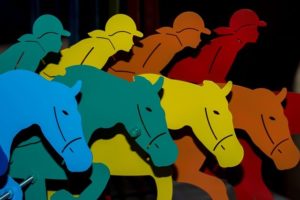What is the Mongol Derby?
Officially the longest horse race in the world, according to Guinness World Records, the Mongol Derby is an endurance race staged annually over a 621-mile, or 1,000-kilometre, stretch of the Mongolian Steppe in Inner Mongolia. The Mongol Derby recreates the ancient message delivery system created by Genghis Khan, founder of the Mongol Empire, which was called ‘Yam’. Riders must collect fresh horses – locally supplied, semi-wild, Mongolian horses owned by nomadic tribespeople – from a series of relay, or support, stations set up at 25-mile intervals along the route, and the race lasts ten days.
Serious injuries, including broken bones, and debilitating conditions, such as heat exhaustion or heatstroke, are commonplace, yet year after year dozens of intrepid riders pay thousands of pounds for the privilege of riding in the Mongol Derby. Participants travel from all over the world to ride in the Mongol Derby and, following a compulsory, three-day training course, in the classroom and on horseback, are ready to embark on what is billed as the ‘toughest equestrian event on the planet’.
Of course, the Mongolian Steppe is an immense expanse of grassland, but the route of the Mongolian Derby changes from year to year, such that riders may need to negotiate a variety of terrain. They are restricted to a ‘corridor’, less than two miles wide, to discourage fording rivers but, otherwise, must navigate themselves over, around or through any geographical features they come across using Global Positioning System (GPS) equipment.
 Although he British Champion Jockey in 2006, 2008 and 2009, Ryan Moore has, since 2015, been first choice jockey to Aidan O’Brien at Ballydoyle Stables, Co. Tipperary. Indeed, it was in that capacity that he completed the 1,000 Guineas – Oaks double for the first time in 2016 and did so again in 2020. Moore had won the 1,000 Guineas twice before, on Homecoming Queen, trained by O’Brien, in 2012 and Legatissimo, trained by David Wachman, in 2015, and the Oaks once before, on Snow Fairy, trained by Ed Dunlop
Although he British Champion Jockey in 2006, 2008 and 2009, Ryan Moore has, since 2015, been first choice jockey to Aidan O’Brien at Ballydoyle Stables, Co. Tipperary. Indeed, it was in that capacity that he completed the 1,000 Guineas – Oaks double for the first time in 2016 and did so again in 2020. Moore had won the 1,000 Guineas twice before, on Homecoming Queen, trained by O’Brien, in 2012 and Legatissimo, trained by David Wachman, in 2015, and the Oaks once before, on Snow Fairy, trained by Ed Dunlop